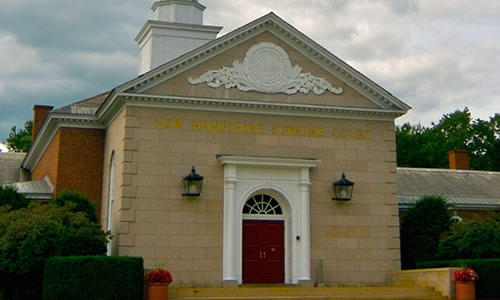By GARRY RAYNO, InDepthNH.org
CONCORD — In a brief filed Monday, the plaintiffs in the Rand education funding suit on appeal before the Supreme Court, say the superior court decision should stand as it follows past rulings, past practices and constitutional provisions.
The case filed by property taxpayers Steven Rand and others, found the state’s administration of the Statewide Education Property Tax was unconstitutional as it results in unequal effective tax rates across the state violating the constitutional provision of “proportional and reasonable taxation.”
In their briefs, the state and the Coalition Communities 2.0 — comprising 26 property wealthy communities — argued the state legislature made a “spending” decision to allow communities that raise more money from statewide property tax revenue than they need to pay for their students’ “adequate education,” to retain the money.
Also, the state Department of Revenue Administration has set the local school tax rate at a negative number to allow unincorporated places with no or few students to avoid paying the statewide property tax.
The state claims the superior court decision violates the constitutional separation of powers provision for the three branches of government, and that unincorporated places are not subject to the Statewide Education Property Tax.
The state claims only the legislature has authority to determine funding and policy, not the judiciary.
“The trial court also properly rejected the latest argument for this disparate treatment,” write the attorneys for the plaintiffs. “Plaintiffs ask that this Court uphold the trial court’s rulings on both issues, reminding the Legislature and the Coalition Communities yet again that everyone in the State, wherever they live, has a constitutional duty to pay uniform taxes to educate all of our children.”
The attorneys note in their brief this is the fourth time the court has been asked to rule on the efforts of a small number of property wealthy communities to avoid paying the full statewide property tax rate, but has sided with the plaintiffs in the prior three decisions.
When the legislature passed the Statewide Education Property Tax in 1999, it tasked local officials to collect the tax.
“This operational structure has fed a persistent resistance in certain communities to remitting to the State the state tax revenue that exceeds the State’s adequacy obligation in those towns,” the attorneys write. “Second, the SWEPT is not a generic tax raising general revenue for the State, but rather was created specifically to raise funds to meet the State’s obligation to fund an adequate education.”
The attorneys note with a state tax the taxing district is the state and not the towns and cities that collect it from each property owner.
Since the Claremont II decision in 1997, the court has been clear that taxes raised to pay for the state’s obligation to pay for an adequate education had to be uniform in rate across the state to satisfy the provision of “proportional and reasonable taxation.”
Yet the legislative history makes clear the motivation for the change the legislature passed in 2011 was “a continuing refusal to accept that extra state funds raised locally should be sent to the State to meet the State’s constitutional responsibility,” the plaintiffs argue.
And the attorneys note the coalition town officials testified the excess SWEPT funds were treated as a general financial windfall and not as additional support for education.
At the time of the change in 2011 there is no mention of any “spending decision,” but just an attempt to quiet the consistent unrest between “donor” and “receiver,” towns, which “flies in the face of this Court’s jurisprudence about the obligation of all New Hampshire taxpayers to contribute at equal rates to the adequate education of all our children, regardless of whether they live in the same town or at opposite ends of the state,” the attorneys write.
The plaintiffs also argue there was no precedent for assigning negative tax rates to unincorporated places so they did not have to pay the SWEPT.
The state argued the tax did not apply to unincorporated places because they are not “municipalities” within the meaning of the SWEPT statute.
The law says the commissioner of revenue administration is to set the SWEPT rate on “all persons and property taxable,” the plaintiffs say and “this Court’s case law also interchangeably uses ‘municipality’ to include unincorporated places.”
And the attorneys argue the decision by Superior Court Judge David Ruoff did not create new law as the State claims and he did not overstep his authority to order the practice of excess funds and negative property tax rates cease.
“The Plaintiffs respectfully ask this Court to not once again defer to the Legislature, which has shown little or no inclination to fix school funding, but rather chooses to relitigate settled law time after time,” the plaintiffs write.
“It is not outside of the Court’s authority to see that laws are applied equitably and that constitutional rights are protected.”
The Supreme Court also has an appeal of Ruoff’s ConVal School District lawsuit as well, which found the state failed to set a reasonable figure for the per pupil cost of an adequate education and the judge set a figure nearly double what the state currently pays at $4,100 per pupil.
The state and Coalition Communities 2.0 have 20 days to respond.
The other half of the Rand suit claiming state aid for education has fallen well short of the actual costs which requires local property taxes to pay the difference and those tax rates vary from community to community and is therefore unconstitutional, is currently being heard in Rockingham County Superior Court this week and next.
Garry Rayno may be reached at garry.rayno@yahoo.com.






